|
|
|
Sort Order |
|
|
|
Items / Page
|
|
|
|
|
|
|
| Srl | Item |
| 1 |
ID:
152414
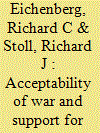

|
|
|
|
|
| Summary/Abstract |
We study the factors that influence citizen support for defense spending in fourteen democracies over the period 2004–2013. We pose two research questions. First, what factors influence citizen support for war and military force? We refer to this as the acceptability of war. Second, in addition to the acceptability of war, what other factors affect support for defense spending? Our principal finding is that citizen acceptance of war and support for defense spending are most influenced by basic beliefs and values. Gender also has a strong negative influence on attitudes toward war and thus indirectly lowers support for defense spending among women. Attitudes toward war and defense spending are also sometimes influenced by short-term threats and by alliance considerations, but the effects are not as substantively meaningful. We conclude with a summary of the results and a discussion of the implications for theory and policy.
|
|
|
|
|
|
|
|
|
|
|
|
|
|
|
|
| 2 |
ID:
152418
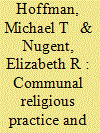

|
|
|
|
|
| Summary/Abstract |
Does religion inevitably promote support for militant politics? Using a new and unique data set compiled from a nationally representative survey in Lebanon, we examine the conditions under which communal religious practice may serve to promote support for or opposition to armed parties. We argue that this relationship, far from being unidirectional and consistent, depends on the interests of the individual sectarian group. For groups engaged in conflict, communal prayer may increase support for arming political parties. For noncombatant groups, however, religion tends to promote opposition to such militarization. Using both observational and experimental evidence, we demonstrate that communal religion increases the salience of group interests through both identity and informational mechanisms. For regular worship attenders, communal religious practice increases the salience of sectarian identity. For nonattenders, informational primes about sectarian interests have the same effect. Among noncombatant groups, this increased salience leads to opposition to armed parties whose presence would threaten the livelihoods and security of those on the sidelines.
|
|
|
|
|
|
|
|
|
|
|
|
|
|
|
|
| 3 |
ID:
152415
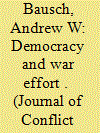

|
|
|
|
|
| Summary/Abstract |
This article uses a laboratory experiment to explore how groups’ internal rules for leader selection affect how leaders select into and fight conflicts. The findings reveal that, counter to expectations, leaders of democratic groups were more likely than leaders of autocratic groups to select into a conflict rather than accept a negotiated settlement. Conditional on conflict occurring, democratic leaders did not mobilize more resources for war than autocratic leaders. However, democratic leaders were less likely to accept a settlement once a war was underway and they expended more effort in the last round of conflict, suggesting once they entered a war they fought for a decisive victory. Domestically, democratic leaders were punished for losing wars more often than autocratic leaders, while winning wars did not benefit democratic leaders significantly.
|
|
|
|
|
|
|
|
|
|
|
|
|
|
|
|
| 4 |
ID:
152420
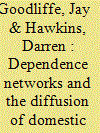

|
|
|
|
|
| Summary/Abstract |
How and to what extent do states influence the level of democracy and autocracy in other states? We argue that states exist internationally in dependence networks with each other and that those networks provide pathways for influence on a state’s domestic institutions. For any given state, a dependence network is a set of partner states with whom it regularly engages in exchanges of valued goods, where those exchanges would be costly to break. We find that an index of three such networks–trade, security and shared international organization membership–significantly influences the domestic political institutions in a given state. These changes are substantively large in the long run, similar in size to regional and global levels of democracy. State capabilities figure heavily in our network measures, thus emphasizing the role of power in the diffusion of domestic political institutions. We also find that network-influenced change works both ways: states can become more autocratic or more democratic.
|
|
|
|
|
|
|
|
|
|
|
|
|
|
|
|
| 5 |
ID:
152413


|
|
|
|
|
| Summary/Abstract |
Gender differences regarding support for the use of force average around 8 percent and are twice the size of differences on non-force issues. This article investigates a related gender gap in support for the use of torture. I investigate threat perceptions as a possible explanation for the gap and find strong support for this hypothesis. Specifically, increased threat perceptions lead men but not women to be more likely to support the use of torture. In addition to providing an explanation for the gender gap in support for torture, this extends prior work that finds increased threat perceptions with respect to terrorism lead to greater support for aggressive policies.
|
|
|
|
|
|
|
|
|
|
|
|
|
|
|
|
| 6 |
ID:
152411
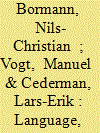

|
|
|
|
|
| Summary/Abstract |
Are certain ethnic cleavages more conflict-prone than others? While only few scholars focus on the contents of ethnicity, most of those who do argue that political violence is more likely to occur along religious divisions than linguistic ones. We challenge this claim by analyzing the path from linguistic differences to ethnic civil war along three theoretical steps: (1) the perception of grievances by group members, (2) rebel mobilization, and (3) government accommodation of rebel demands. Our argument is tested with a new data set of ethnic cleavages that records multiple linguistic and religious segments for ethnic groups from 1946 to 2009. Adopting a relational perspective, we assess ethnic differences between potential challengers and the politically dominant group in each country. Our findings indicate that intrastate conflict is more likely within linguistic dyads than among religious ones. Moreover, we find no support for the thesis that Muslim groups are particularly conflict-prone.
|
|
|
|
|
|
|
|
|
|
|
|
|
|
|
|
| 7 |
ID:
152417


|
|
|
|
|
| Summary/Abstract |
Countries interested in the promotion of political development often provide aid in the form of democracy assistance. However, some regimes resist these attempts to promote democracy, introducing repressive measures to counteract their effectiveness. Hence, democracy assistance sometimes has the unintended consequence of curtailing democracy. This article explains how the size of the targeted regime’s military determines the effectiveness of democracy assistance and why it can sometimes result in lower levels of political freedom. Large militaries, often holding a privileged position in authoritarian regimes, will be threatened by political liberalization and its associated redistribution of resources. They will thus work with the regime to limit the effect of democracy assistance, while their size makes this repression more feasible. In states with smaller militaries, regimes have less incentive and capacity for repression, and democracy assistance is more successful at empowering democratic opposition. Cross-national statistical analysis of the United States Agency for International Development democracy assistance supports the argument.
|
|
|
|
|
|
|
|
|
|
|
|
|
|
|
|
| 8 |
ID:
152410
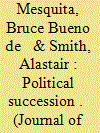

|
|
|
|
|
| Summary/Abstract |
In addition to everyday political threats, leaders risk removal from office through coups and mass movements such as rebellion. Further, all leaders face threats from shocks such as downturns in their health, their country’s economy, or their government’s revenue. By integrating these risks into the selectorate theory, we characterize the conditions under which each threat is pertinent and the countermoves (purges, democratization, expansion of public goods, and expansion of private benefits) that best enable the leader to survive in office. The model identifies new insights into the nature of assassins; the relative risk of different types of leader removal as a function of the extant institutions of government; and the endogenous factors driving better or worse public policy and decisions to democratize or become more autocratic. Importantly, the results highlight how an increase in the risk of deposition via one means intensifies other removal risks.
|
|
|
|
|
|
|
|
|
|
|
|
|
|
|
|
|
|
|
|
|